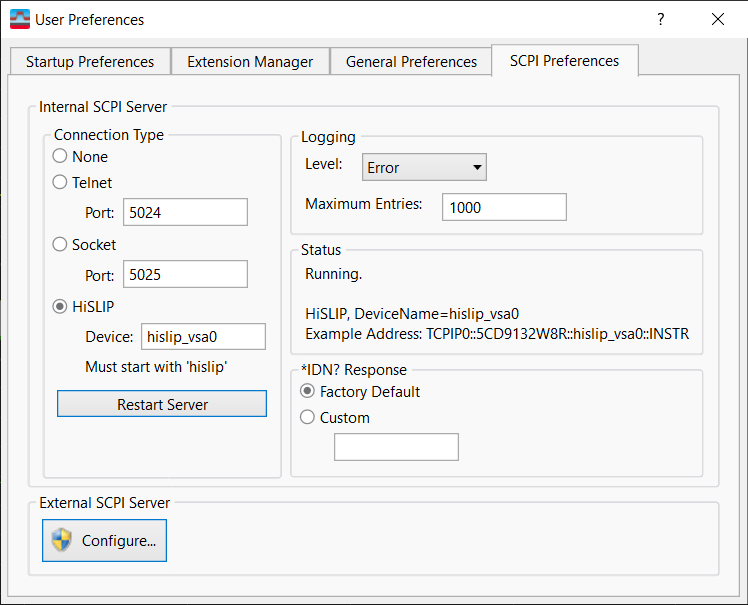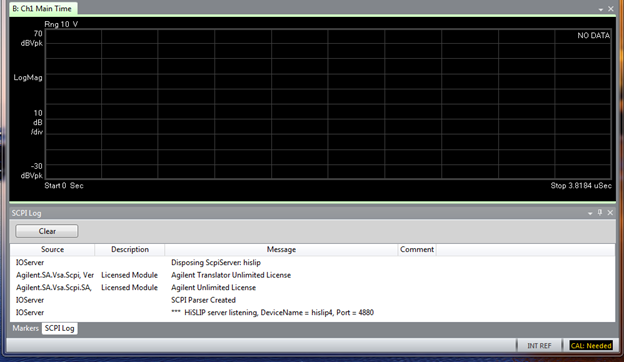Configuring SCPI
You can configure the VSA Software to use an Internal SCPI Server, which runs in-process, or an External SCPI Server, which runs out-of-process. The Internal SCPI Server is preferred since it is faster and more flexible.
Internal SCPI Server Settings
To configure the VSA Software's Internal SCPI Server, select from the main menu of the 89600 VSA to display the window shown below:

The SCPI Preferences persist on a per-user-basis in the VSA software user-preferences file. The default SCPI preferences are shown below. Like all user preferences, these user preferences are not affected by a preset and are the initial setting only until you change them:
- Connection Type: HiSLIP
- Logging Level: Error
- Logging Maximum Entries: 1000
Connection Type
For the connection type, you can select Telnet, Socket, or HiSLIP. If you change the connection type, you must click the button to establish the new connection.
For Telnet and Socket you can also select the port. Telnet and Socket only work for the first instance of the VSA software. If a subsequent instance is launched, then the other instances do not start their internal SCPI server. If another application is using one of the Telnet or Socket ports, the SCPI server will try to start--if it can't, then it will indicate an Unable to Start status in the SCPI Preferences window and in the SCPI Log.
HiSLIP provides a more robust SCPI connection than Socket or Telnet. HiSlip works with multiple instances of the VSA Software and uses a different device name for each instance of the VSA Software.
When multiple instances of the VSA software are running, the VSA software creates a unique HiSLIP device name for each VSA instance. For the first VSA instance, the name entered in the Device field is the device name (default is "hislip_vsa0"). For subsequent VSA instances, any trailing numeric value is stripped from the initial instance's device name and replaced with a VSA port number that is used with the .NET API and is unique for each instance of VSA. This port number is not used for SCPI purposes. It is only used to ensure uniqueness and predictable mapping to a specific VSA instance.
While the device name always starts with "hislip", you can change the part of the name that follows "hislip" by double-clicking the Device field, entering the change, and clicking Restart Server to apply the change. Any VSA instances started after the change will be given the custom device name plus the VSA port number to ensure uniqueness.
Status
The Status box shows the status of the internal SCPI server, whether it is running or disabled, and which type of connection is running.
Logging and SCPI Log
The Logging box allows you to set the level of SCPI logging and the maximum number of rows (to avoid memory issues)shown in the SCPI Log . The SCPI Log is displayed in the bottom of the 89600 VSA software window, and shows incoming SCPI commands. If SCPI Command and Response is selected as the Logging Level, the SCPI Log also shows the response for SCPI queries.
The following illustration is shown with verbose logging on. You can clear the SCPI Log, select multiple rows, and use a right- click context menu to copy selected rows to the Windows clip board.

External SCPI Server
The button allows you to configure and launches the out of process, External SCPI Server. This was the only choice available prior to 89600 VSA Software Version 18.5, and is provided for backward compatibility. For details about this feature, See Configuring the External SCPI Server.
The out-of-process External SCPI Server can be disabled (hidden) by changing the following line from "false" to "true" in the VSA Software app.config and/or app.x64.config file under the <appSettings> section.
<add key="DisableExternalScpiServerConfiguration" value="false"/>
